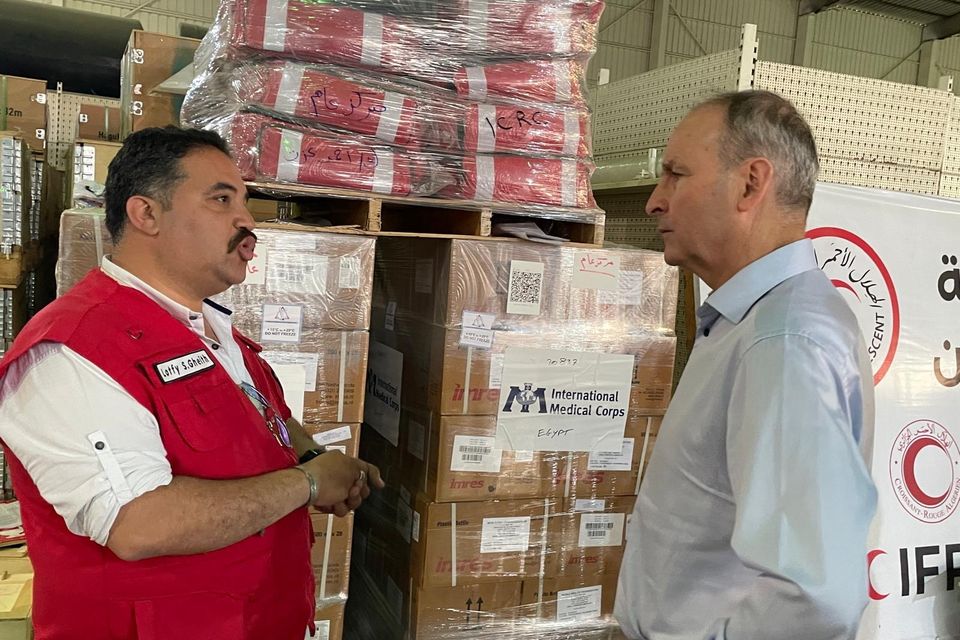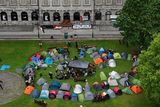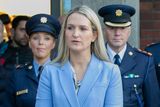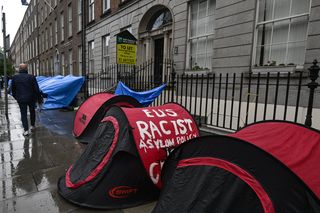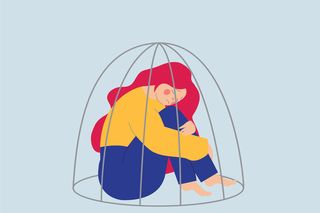Tánaiste says ‘no doubt Gazans are being collectively punished’ by Israel, decrying ‘inhumanity on a grand scale’ on Rafah visit
Tánaiste Micheál Martin meets with Red Crescent workers during his visit to Rafah, Egypt, on the border with Gaza.
Tánaiste Micheál Martin has said he has “no doubt” that the people of Gaza are being collectively punished by Israel “contrary to international law” during a visit to the Rafah crossing in Egypt today.
Mr Martin met war-scarred women and children at a hospital close to the Rafah crossing as part of his visit to the Middle East on Tuesday.
Mr Martin shook his head in horror when brought to the bedsides of the maimed, many of whom had suffered amputations at the Al-Arish hospital.
Earlier he had travelled to the border crossing with Gaza amid a lull in Israeli offensive actions and heard of how Israel is restricting truck supplies going in — and how humanitarian air workers and drivers constantly fear death in their missions of mercy.
On the tarmac of an Egyptian military airbase, the Tánaiste gave an impromptu press conference to speak of his disgust at seeing stockpiles of supplies that had been blocked from going to their intended recipients in Gaza.
“I have no doubt now that the Palestinian people as a whole are being collectively punished, contrary to international law,” he said.
“It is inhumanity on a grand scale.”
Mr Martin met UNRWA officials at the border and also toured a nearby distribution depot run by the Egyptian Red Crescent.
But it was at the hospital that he came face to face with the weary survivors of Gaza’s six-month pummelling, many of whom have lost close family members.
Ataaf Saleh, who is in her fifties, suffered multiple injuries - and the loss of four members of her family — when a shell exploded over her house in Rafah. She lost one leg, with the other in plaster. She told the Tánaiste that Gaza is now “uninhabitable” and there is nowhere to live if she goes back.
Dua Samir had also lost a leg, and members of her family, and had son Yusuf (4) beside her in bed. They were hit by rocket fragments when their house was demolished by an airstrike a month ago.
Mr Martin was told by doctors that there were 39 ICU beds, all full with the most seriously injured while most hospitals in Gaza are out of action due to the destruction of the war, which entered its 200th day on Tuesday.
At the Rafah crossing the Tánaiste conferred with aid leaders in the company of UN Special Rapporteur on Palestine, Francesca Albanese, who was in Ireland last week.
On his way he passed hundreds of trucks lined up to cross, before seeing stockpiled vital equipment — including clinical devices and ICU machines for children — at the yard, where many items have been forbidden entry by Israel. They include thousands of sleeping bags — outlawed apparently because they are green, the colour of Islam. Vaccinations for waterborne diseases have also been impounded amid what Mr Martin referred to as a glut of “micro-checking.”
Dr Lofty Gheith said the Israelis were applying four types of checks and scans, including X-ray, while plastic pallet wrapping had to be see-through and the pallets themselves wood. Some 15pc of aid is not being allowed through — “they stop the most important items” — and another 25pc is chronically delayed with promises of being permitted in future.
Outside were up to 300 desperate Gazans, clamouring for re-entry, some of whom have been stranded for months after escaping to limbo in Egypt.
Adla Zaki Mohamed (65), who was treated for cancer, was desperate to return to her family. She went to the Mansoura hospital two months ago. A man named Amad had his five-year-old son Hanmad on his shoulders. The boy has ADHD and suffered terribly from the bombing. Amad said no fewer than 115 members of his extended family had died in the Israeli assault since October 7.
Mr Martin said it appeared the Israelis were “trying to demonstrate who is in charge,” but vast numbers of civilians were suffering. “I’m coming to the conclusion that the population of Gaza is being systematically punished.”
He said aid drivers were still being targeted. “They speak of regularly seeing people shot and dying, and the presence of dead bodies on the road or alongside. They themselves regularly get shot at, and the non-collection of bodies seems calculated to cause hurt and offence. They are very fatalistic about the risks they are taking.
“But there is a complete breakdown of trust between the UN and the IDF. Previously, as with UNIFIL, a trust was established,” he said, choosing not to comment on any implications for Irish UN troops serving in Southern Lebanon. “It’s a different theatre, but we are worried about escalation across the region.
“If they could get 200 trucks in a day it could stave off famine. The numbers now are very small. We should be able to send in 500 trucks a day.”
Mwafaq Al-Khatib, the manager of an orphanage where 200 children out of 1,300 have been killed since the Israeli attacks, said he needed to return to resume duties. He showed bandages around his abdomen for wounds sustained while falling through a bombed house in Khan Younis. He had been trying for three weeks to get back, he said, but there were strict limits on returns.
Mr Martin complained about the effect of what was happening on children in particular, with the majority now badly under weight, malnourished and even starving. “We have to end this war,” he said.
But the people he had spoken to about the threatened Israeli offensive against Rafah — home to over 1.2 million miserable refugees— had left him in no doubt that “it is going to happen.
“An invasion here would be catastrophic,” he said.
Join the Irish Independent WhatsApp channel
Stay up to date with all the latest news
